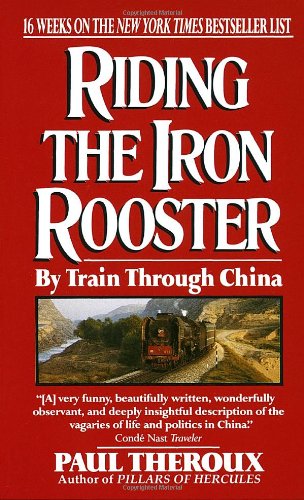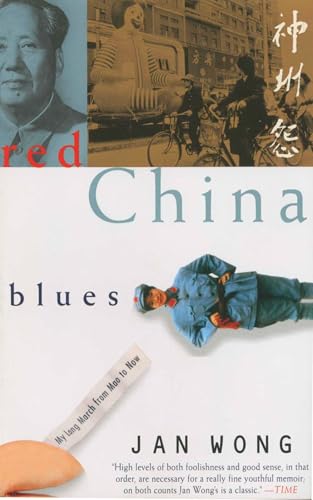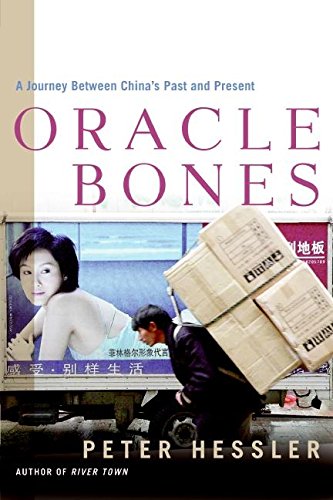My China Reading List
Explore the best books on China with My China Reading List. Discover must-read titles covering Chinese history, culture, politics, and more for insightful perspectives on this fascinating country.


Book
River Town
by Peter Hessler
A New York Times Notable Book Winner of the Kiriyama Book Prize In the heart of China's Sichuan province, amid the terraced hills of the Yangtze River valley, lies the remote town of Fuling. Like many other small cities in this ever-evolving country, Fuling is heading down a new path of change and growth, which came into remarkably sharp focus when Peter Hessler arrived as a Peace Corps volunteer, marking the first time in more than half a century that the city had an American resident. Hessler taught English and American literature at the local college, but it was his students who taught him about the complex processes of understanding that take place when one is immersed in a radically different society. Poignant, thoughtful, funny, and enormously compelling, River Town is an unforgettable portrait of a city that is seeking to understand both what it was and what it someday will be.

Book
Iron and Silk
by Mark Salzman
Salzman captures post-cultural revolution China through his adventures as a young American English teacher in China and his shifu-tudi (master-student) relationship with China's foremost martial arts teacher.

Book
War Trash
by Ha Jin
Ha Jin’s masterful new novel casts a searchlight into a forgotten corner of modern history, the experience of Chinese soldiers held in U.S. POW camps during the Korean War. In 1951 Yu Yuan, a scholarly and self-effacing clerical officer in Mao’s “volunteer” army, is taken prisoner south of the 38th Parallel. Because he speaks English, he soon becomes an intermediary between his compatriots and their American captors.With Yuan as guide, we are ushered into the secret world behind the barbed wire, a world where kindness alternates with blinding cruelty and one has infinitely more to fear from one’s fellow prisoners than from the guards. Vivid in its historical detail, profound in its imaginative empathy, War Trash is Ha Jin’s most ambitious book to date.

Book
Red China Blues
by Jan Wong
Jan Wong, a Canadian of Chinese descent, went to China as a starry-eyed Maoist in 1972 at the height of the Cultural Revolution. A true believer--and one of only two Westerners permitted to enroll at Beijing University--her education included wielding a pneumatic drill at the Number One Machine Tool Factory. In the name of the Revolution, she renounced rock & roll, hauled pig manure in the paddy fields, and turned in a fellow student who sought her help in getting to the United States. She also met and married the only American draft dodger from the Vietnam War to seek asylum in China. Red China Blues is Wong's startling--and ironic--memoir of her rocky six-year romance with Maoism (which crumbled as she became aware of the harsh realities of Chinese communism); her dramatic firsthand account of the devastating Tiananmen Square uprising; and her engaging portrait of the individuals and events she covered as a correspondent in China during the tumultuous era of capitalist reform under Deng Xiaoping. In a frank, captivating, deeply personal narrative she relates the horrors that led to her disillusionment with the "worker's paradise." And through the stories of the people--an unhappy young woman who was sold into marriage, China's most famous dissident, a doctor who lengthens penises--Wong reveals long-hidden dimensions of the world's most populous nation. In setting out to show readers in the Western world what life is like in China, and why we should care, she reacquaints herself with the old friends--and enemies of her radical past, and comes to terms with the legacy of her ancestral homeland.



Book
Guns Germs and Steel
by Jared Diamond
"Fascinating.... Lays a foundation for understanding human history."—Bill Gates Winner of the Pulitzer Prize, Guns, Germs, and Steel is a brilliant work answering the question of why the peoples of certain continents succeeded in invading other continents and conquering or displacing their peoples. This edition includes a new chapter on Japan and all-new illustrations drawn from the television series. Until around 11,000 BC, all peoples were still Stone Age hunter/gatherers. At that point, a great divide occurred in the rates that human societies evolved. In Eurasia, parts of the Americas, and Africa, farming became the prevailing mode of existence when indigenous wild plants and animals were domesticated by prehistoric planters and herders. As Jared Diamond vividly reveals, the very people who gained a head start in producing food would collide with preliterate cultures, shaping the modern world through conquest, displacement, and genocide.The paths that lead from scattered centers of food to broad bands of settlement had a great deal to do with climate and geography. But how did differences in societies arise? Why weren't native Australians, Americans, or Africans the ones to colonize Europe? Diamond dismantles pernicious racial theories tracing societal differences to biological differences. He assembles convincing evidence linking germs to domestication of animals, germs that Eurasians then spread in epidemic proportions in their voyages of discovery. In its sweep, Guns, Germs and Steel encompasses the rise of agriculture, technology, writing, government, and religion, providing a unifying theory of human history as intriguing as the histories of dinosaurs and glaciers.